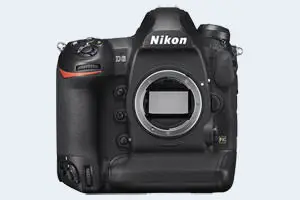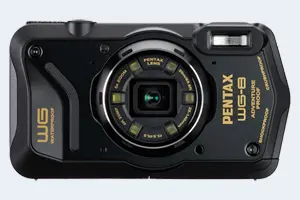Nikon D6 vs Pentax WG-8
The Nikon D6 and the Pentax WG-8 are two digital cameras that were officially introduced, respectively, in February 2020 and June 2024. The D6 is a DSLR, while the WG-8 is a fixed lens compact. The cameras are based on a full frame (D6) and a 1/2.3-inch (WG-8) sensor. The Nikon has a resolution of 20.7 megapixels, whereas the Pentax provides 20.2 MP.
Below is an overview of the main specs of the two cameras as a starting point for the comparison.

Check D6 price at
amazon.com

Check WG-8 price at
amazon.com
Going beyond this snapshot of core features and characteristics, what are the differences between the Nikon D6 and the Pentax WG-8? Which one should you buy? Read on to find out how these two cameras compare with respect to their body size, their imaging sensors, their shooting features, their input-output connections, and their reception by expert reviewers.
Body comparison
An illustration of the physical size and weight of the Nikon D6 and the Pentax WG-8 is provided in the side-by-side display below. The two cameras are presented according to their relative size. Three consecutive perspectives from the front, the top, and the back are available. All size dimensions are rounded to the nearest millimeter.
The WG-8 can be obtained in two different colors (black, green), while the D6 is only available in black.
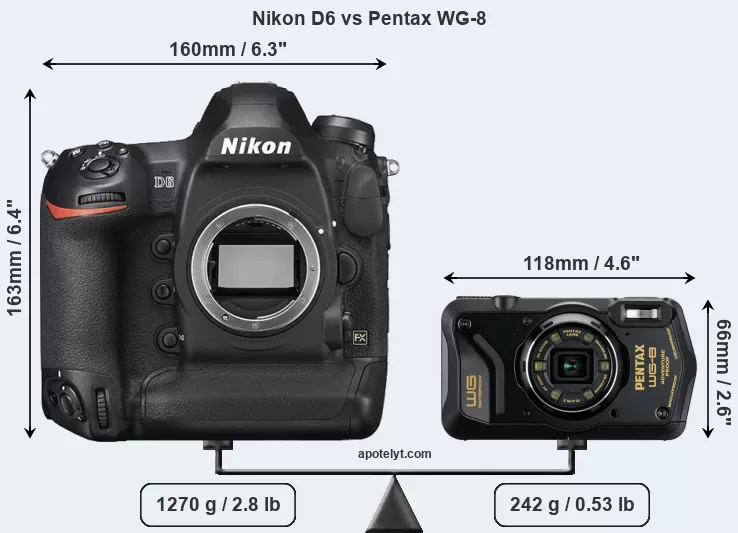
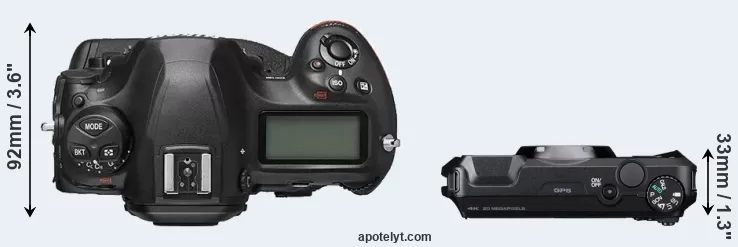
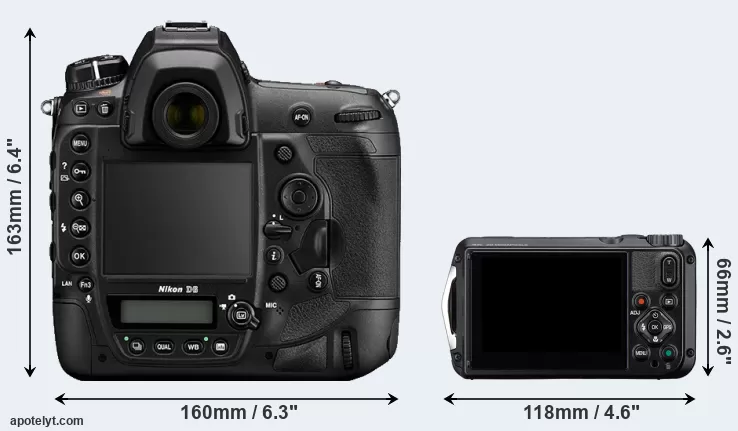
If the front view area (width x height) of the cameras is taken as an aggregate measure of their size, the Pentax WG-8 is considerably smaller (70 percent) than the Nikon D6. In this context, it is worth noting that both cameras are splash and dust-proof and can, hence, be used in inclement weather conditions or harsh environments. More than that, the WG-8 is water-proof up to 20m and can, thus, be used for underwater photography.
The above size and weight comparisons are to some extent incomplete and possibly misleading, as the WG-8 has a lens built in, whereas the D6 is an interchangeable lens camera that requires a separate lens. Attaching the latter will add extra weight and bulk to the setup. You can compare the optics available for the D6 and their specifications in the Nikon Lens Catalog.
Concerning battery life, the D6 gets 3580 shots out of its Nikon EN-EL18c battery, while the WG-8 can take 340 images on a single charge of its Ricoh DB-110 power pack. As can be seen in the images above, the D6 has a battery grip built in. This facilitates image-taking in portrait orientation and gives it additional battery power.
The following table provides a synthesis of the main physical specifications of the two cameras and other similar ones. If you want to switch the focus of the display and review another camera pair, you can move across to the CAM-parator tool and choose from the broad selection of possible camera comparisons there.

| Camera Model |
Camera Width |
Camera Height |
Camera Depth |
Camera Weight |
Battery Life |
Weather Sealing |
Camera Launch |
Launch Price |
Street Price |
||
|---|---|---|---|---|---|---|---|---|---|---|---|
| 1. | Nikon D6 | 160 mm | 163 mm | 92 mm | 1270 g | 3580 | Y | Feb 2020 | US$ 6 499 | amazon.com | |
| 2. | Pentax WG-8 | 118 mm | 66 mm | 33 mm | 242 g | 340 | Y | Jun 2024 | US$ 399 | amazon.com | |
| 3. | Canon 1D X Mark II | 158 mm | 168 mm | 83 mm | 1530 g | 1210 | Y | Feb 2016 | US$ 5 999 | ebay.com | |
| 4. | Canon 1D X Mark III | 158 mm | 168 mm | 83 mm | 1440 g | 2850 | Y | Jan 2020 | US$ 6 499 | amazon.com | |
| 5. | Nikon D3X | 160 mm | 157 mm | 88 mm | 1260 g | 4400 | Y | Dec 2008 | US$ 7 999 | ebay.com | |
| 6. | Nikon D4 | 160 mm | 157 mm | 91 mm | 1340 g | 2600 | Y | Jan 2012 | US$ 5 999 | ebay.com | |
| 7. | Nikon D4S | 160 mm | 157 mm | 91 mm | 1350 g | 3020 | Y | Feb 2014 | US$ 6 499 | ebay.com | |
| 8. | Nikon D5 | 160 mm | 159 mm | 92 mm | 1415 g | 3780 | Y | Jan 2016 | US$ 6 499 | ebay.com | |
| 9. | Nikon D600 | 141 mm | 113 mm | 82 mm | 850 g | 900 | Y | Sep 2012 | US$ 2 099 | ebay.com | |
| 10. | Nikon D610 | 141 mm | 113 mm | 82 mm | 850 g | 900 | Y | Oct 2013 | US$ 1 999 | ebay.com | |
| 11. | Nikon D750 | 141 mm | 113 mm | 78 mm | 750 g | 1230 | Y | Sep 2014 | US$ 2 299 | ebay.com | |
| 12. | Nikon D780 | 144 mm | 116 mm | 76 mm | 840 g | 2260 | Y | Jan 2020 | US$ 2 299 | amazon.com | |
| 13. | Nikon W300 | 112 mm | 66 mm | 29 mm | 231 g | 280 | Y | May 2017 | US$ 389 | ebay.com | |
| 14. | Panasonic TS7 | 117 mm | 76 mm | 37 mm | 319 g | 300 | Y | May 2018 | US$ 449 | ebay.com | |
| 15. | Pentax WG-1000 | 116 mm | 69 mm | 51 mm | 220 g | 300 | Y | Jun 2024 | US$ 229 | amazon.com | |
| 16. | Ricoh WG-6 | 118 mm | 66 mm | 33 mm | 246 g | 340 | Y | Feb 2019 | US$ 399 | amazon.com | |
| 17. | Sony HX99 | 102 mm | 58 mm | 36 mm | 242 g | 370 | n | Aug 2018 | US$ 449 | ebay.com | |
| Note: Measurements and pricing do not include easily detachable parts, such as add-on or interchangeable lenses or optional viewfinders. | |||||||||||
Any camera decision will obviously take relative prices into account. The listed launch prices provide an indication of the market segment that the manufacturer of the cameras have been targeting. The WG-8 was launched at a lower price than the D6, despite having a lens built in. Usually, retail prices stay at first close to the launch price, but after several months, discounts become available. Later in the product cycle and, in particular, when the replacement model is about to appear, further discounting and stock clearance sales often push the camera price considerably down. Then, after the new model is out, very good deals can frequently be found on the pre-owned market.
Sensor comparison
The size of the imaging sensor is a crucial determinant of image quality. All other things equal, a large sensor will have larger individual pixel-units that offer better low-light sensitivity, wider dynamic range, and richer color-depth than smaller pixels in a sensor of the same technological generation. Moreover, a large sensor camera will give the photographer more control over depth-of-field in the image and, thus, the ability to better isolate a subject from the background. On the downside, larger sensors tend to be associated with larger, more expensive camera bodies and lenses.
Of the two cameras under consideration, the Nikon D6 features a full frame sensor and the Pentax WG-8 a 1/2.3-inch sensor. The sensor area in the WG-8 is 97 percent smaller. As a result of these sensor size differences, the cameras have a format factor of, respectively, 1.0 and 5.6. The sensor in the D6 has a native 3:2 aspect ratio, while the one in the WG-8 offers a 4:3 aspect.
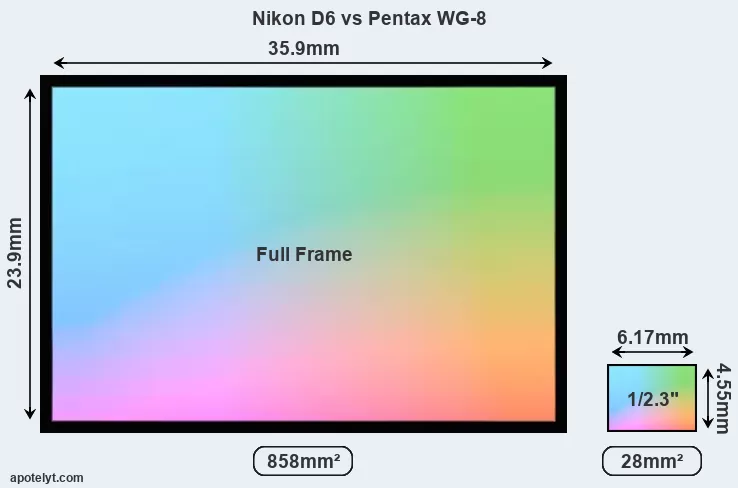
With 20.7MP, the D6 offers a slightly higher resolution than the WG-8 (20.2MP), but the D6 nevertheless has larger individual pixels (pixel pitch of 6.44μm versus 1.18μm for the WG-8) due to its larger sensor. However, the WG-8 is a much more recent model (by 4 years and 3 months) than the D6, and its sensor will have benefitted from technological advances during this time that further enhance the light gathering capacity of its pixels. Coming back to sensor resolution, it should be mentioned that the WG-8 has no anti-alias filter installed, so that it can capture all the detail its sensor resolves.
The Nikon D6 has a native sensitivity range from ISO 100 to ISO 102400, which can be extended to ISO 50-3280000. The corresponding ISO settings for the Pentax WG-8 are ISO 125 to ISO 6400 (no boost).
Technology-wise, both cameras are equipped with CMOS (Complementary Metal–Oxide–Semiconductor) sensors. Both cameras use a Bayer filter for capturing RGB colors on a square grid of photosensors. This arrangement is found in most digital cameras.
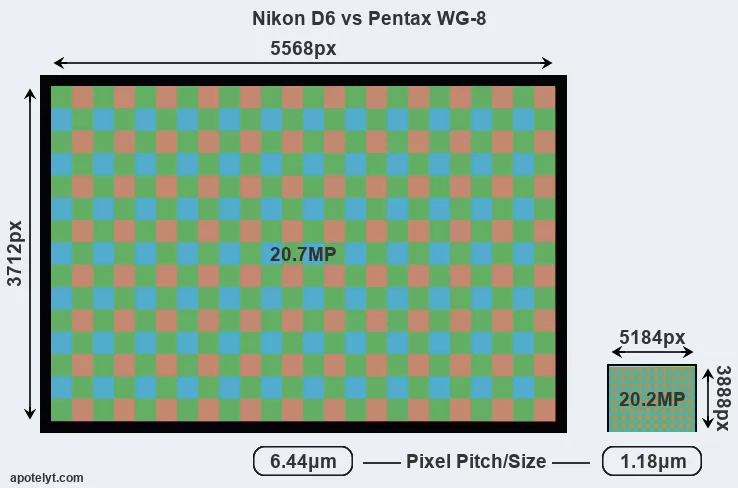
For many cameras, data on sensor performance has been reported by DXO Mark. This service determines an overall sensor rating, as well as sub-scores for low-light sensitivity ("DXO Sports"), dynamic range ("DXO Landscape"), and color depth ("DXO Portrait"). The table below summarizes the physical sensor characteristics and sensor quality findings and compares them across a set of similar cameras.

| Camera Model |
Sensor Class |
Resolution (MP) |
Horiz. Pixels |
Vert. Pixels |
Video Format |
DXO Portrait |
DXO Landscape |
DXO Sports |
DXO Overall |
||
|---|---|---|---|---|---|---|---|---|---|---|---|
| 1. | Nikon D6 | Full Frame | 20.7 | 5568 | 3712 | 4K/30p | 25.3 | 14.3 | 2886 | 95 | |
| 2. | Pentax WG-8 | 1/2.3 | 20.2 | 5184 | 3888 | 4K/30p | 20.9 | 12.8 | 1626 | 54 | |
| 3. | Canon 1D X Mark II | Full Frame | 20.0 | 5472 | 3648 | 4K/60p | 24.1 | 13.5 | 3207 | 88 | |
| 4. | Canon 1D X Mark III | Full Frame | 20.0 | 5472 | 3648 | 4K/60p | 24.2 | 14.5 | 3248 | 91 | |
| 5. | Nikon D3X | Full Frame | 24.4 | 6048 | 4032 | none | 24.7 | 13.7 | 1992 | 88 | |
| 6. | Nikon D4 | Full Frame | 16.2 | 4928 | 3280 | 1080/30p | 24.7 | 13.1 | 2965 | 89 | |
| 7. | Nikon D4S | Full Frame | 16.2 | 4928 | 3280 | 1080/60p | 24.4 | 13.3 | 3074 | 89 | |
| 8. | Nikon D5 | Full Frame | 20.7 | 5588 | 3712 | 4K/30p | 25.1 | 12.3 | 2343 | 88 | |
| 9. | Nikon D600 | Full Frame | 24.2 | 6016 | 4016 | 1080/30p | 25.1 | 14.2 | 2980 | 94 | |
| 10. | Nikon D610 | Full Frame | 24.2 | 6016 | 4016 | 1080/30p | 25.1 | 14.4 | 2925 | 94 | |
| 11. | Nikon D750 | Full Frame | 24.2 | 6016 | 4016 | 1080/60p | 24.8 | 14.5 | 2956 | 93 | |
| 12. | Nikon D780 | Full Frame | 24.3 | 6048 | 4024 | 4K/30p | 25.3 | 14.3 | 2877 | 95 | |
| 13. | Nikon W300 | 1/2.3 | 15.9 | 4608 | 3456 | 4K/30p | 20.5 | 12.0 | 938 | 50 | |
| 14. | Panasonic TS7 | 1/2.3 | 20.2 | 5184 | 3888 | 4K/30p | 20.6 | 12.1 | 1028 | 51 | |
| 15. | Pentax WG-1000 | 1/2.3 | 15.9 | 4608 | 3456 | 1080/30p | 20.9 | 12.8 | 1626 | 54 | |
| 16. | Ricoh WG-6 | 1/2.3 | 20.2 | 5184 | 3888 | 4K/30p | 20.7 | 12.2 | 1104 | 52 | |
| 17. | Sony HX99 | 1/2.3 | 18.0 | 4896 | 3672 | 4K/30p | 20.6 | 12.1 | 1058 | 51 | |
| Note: DXO values in italics represent estimates based on sensor size and age. | |||||||||||
Many modern cameras are not only capable of taking still images, but can also record movies. Both cameras under consideration are equipped with sensors that have a sufficiently high read-out speed for moving images, and both provide the same movie specifications (4K/30p).
Feature comparison
Apart from body and sensor, cameras can and do differ across a range of features. For example, the D6 has an optical viewfinder, which can be very useful when shooting in bright sunlight. In contrast, the WG-8 relies on live view and the rear LCD for framing. The adjacent table lists some of the other core features of the Nikon D6 and Pentax WG-8 along with similar information for a selection of comparators.

| Camera Model |
Viewfinder (Type or 000 dots) |
Control Panel (yes/no) |
LCD Specifications (inch/000 dots) |
LCD Attach- ment |
Touch Screen (yes/no) |
Max Shutter Speed * |
Max Shutter Flaps * |
Built-in Flash (yes/no) |
Built-in Image Stab |
||
|---|---|---|---|---|---|---|---|---|---|---|---|
| 1. | Nikon D6 | optical | Y | 3.2 / 2359 | fixed | Y | 1/8000s | 14.0/s | n | n | |
| 2. | Pentax WG-8 | none | n | 3.0 / 1040 | fixed | n | 1/4000s | 8.0/s | Y | n | |
| 3. | Canon 1D X Mark II | optical | Y | 3.2 / 1620 | fixed | Y | 1/8000s | 16.0/s | n | n | |
| 4. | Canon 1D X Mark III | optical | Y | 3.2 / 2100 | fixed | Y | 1/8000s | 20.0/s | n | n | |
| 5. | Nikon D3X | optical | Y | 3.0 / 922 | fixed | n | 1/8000s | 5.0/s | n | n | |
| 6. | Nikon D4 | optical | Y | 3.2 / 921 | fixed | n | 1/8000s | 11.0/s | n | n | |
| 7. | Nikon D4S | optical | Y | 3.2 / 921 | fixed | n | 1/8000s | 11.0/s | n | n | |
| 8. | Nikon D5 | optical | Y | 3.2 / 2359 | fixed | Y | 1/8000s | 14.0/s | n | n | |
| 9. | Nikon D600 | optical | Y | 3.0 / 921 | fixed | n | 1/4000s | 5.5/s | Y | n | |
| 10. | Nikon D610 | optical | Y | 3.2 / 921 | fixed | n | 1/4000s | 6.0/s | Y | n | |
| 11. | Nikon D750 | optical | Y | 3.2 / 1229 | tilting | n | 1/4000s | 6.0/s | Y | n | |
| 12. | Nikon D780 | optical | Y | 3.2 / 2359 | tilting | Y | 1/8000s | 12.0/s | n | n | |
| 13. | Nikon W300 | none | n | 3.0 / 921 | fixed | n | 1/4000s | 7.0/s | Y | Y | |
| 14. | Panasonic TS7 | 1170 | n | 3.0 / 1040 | fixed | n | 1/1300s | 10.0/s | Y | Y | |
| 15. | Pentax WG-1000 | none | n | 2.7 / 230 | fixed | n | 1/2000s | 8.0/s | Y | n | |
| 16. | Ricoh WG-6 | none | n | 3.0 / 1040 | fixed | n | 1/4000s | 1.0/s | Y | n | |
| 17. | Sony HX99 | 638 | n | 3.0 / 922 | tilting | Y | 1/2000s | 10.0/s | Y | Y | |
| Note: *) Information refers to the mechanical shutter, unless the camera only has an electronic one. | |||||||||||
One feature that is present on the D6, but is missing on the WG-8 is a top-level LCD. While being, of course, smaller than the rear screen, the control panel conveys some of the essential shooting information and can be convenient for quick and easy settings verification.
The reported shutter speed information refers to the use of the mechanical shutter. Yet, some cameras only have an electronic shutter, while others have an electronic shutter in addition to a mechanical one. In fact, the WG-8 is one of those camera that have an additional electronic shutter, which makes completely silent shooting possible. However, this mode is less suitable for photographing moving objects (risk of rolling shutter) or shooting under artificial light sources (risk of flickering).
The Nikon D6 and the Pentax WG-8 both have an intervalometer built-in. This enables the photographer to capture time lapse sequences, such as flower blooming, a sunset or moon rise, without purchasing an external camera trigger and related software.
The D6 writes its imaging data to CFexpress (type B) or XQD cards, while the WG-8 uses SDXC cards. The D6 features dual card slots, which can be very useful in case a memory card fails. In contrast, the WG-8 only has one slot.
Connectivity comparison
For some imaging applications, the extent to which a camera can communicate with its environment can be an important aspect in the camera decision process. The table below provides an overview of the connectivity of the Nikon D6 and Pentax WG-8 and, in particular, the interfaces the cameras (and selected comparators) provide for accessory control and data transfer.

| Camera Model |
Hotshoe Port |
Internal Mic / Speaker |
Microphone Port |
Headphone Port |
HDMI Port |
USB Port |
WiFi Support |
NFC Support |
Bluetooth Support |
||
|---|---|---|---|---|---|---|---|---|---|---|---|
| 1. | Nikon D6 | Y | stereo / mono | Y | Y | mini | 3.1 | Y | - | Y | |
| 2. | Pentax WG-8 | - | mono / mono | - | - | - | 3.0 | - | - | - | |
| 3. | Canon 1D X Mark II | Y | mono / mono | Y | Y | mini | 3.0 | - | - | - | |
| 4. | Canon 1D X Mark III | Y | mono / mono | Y | Y | mini | 3.1 | Y | - | Y | |
| 5. | Nikon D3X | Y | - / - | - | - | mini | 2.0 | - | - | - | |
| 6. | Nikon D4 | Y | mono / mono | Y | Y | micro | 2.0 | - | - | - | |
| 7. | Nikon D4S | Y | mono / mono | Y | Y | mini | 2.0 | - | - | - | |
| 8. | Nikon D5 | Y | stereo / mono | Y | Y | mini | 3.0 | - | - | - | |
| 9. | Nikon D600 | Y | mono / mono | Y | Y | mini | 2.0 | - | - | - | |
| 10. | Nikon D610 | Y | mono / mono | Y | Y | mini | 2.0 | - | - | - | |
| 11. | Nikon D750 | Y | stereo / mono | Y | Y | mini | 2.0 | Y | - | - | |
| 12. | Nikon D780 | Y | stereo / mono | Y | Y | mini | 3.1 | Y | - | Y | |
| 13. | Nikon W300 | - | stereo / mono | - | - | micro | 2.0 | Y | - | Y | |
| 14. | Panasonic TS7 | - | stereo / mono | - | - | micro | 2.0 | Y | - | - | |
| 15. | Pentax WG-1000 | - | mono / mono | - | - | - | 2.0 | - | - | - | |
| 16. | Ricoh WG-6 | - | mono / mono | - | - | micro | 3.0 | - | - | - | |
| 17. | Sony HX99 | - | stereo / mono | - | - | micro | 2.0 | Y | Y | Y |
It is notable that the D6 has a hotshoe, while the WG-8 does not. This socket makes it possible to easily attach optional accessories, such as an external flash gun.
Studio photographers will appreciate that the Nikon D6 (unlike the WG-8) features a PC Sync socket, so that professional strobe lights can be controlled by the camera.
Both the D6 and the WG-8 are recent models that are part of the current product line-up. The D6 replaced the earlier Nikon D5, while the WG-8 does not have a direct predecessor. Further information on the two cameras (e.g. user guides, manuals), as well as related accessories, can be found on the official Nikon and Pentax websites.
Review summary
So what is the bottom line? Is the Nikon D6 better than the Pentax WG-8 or vice versa? Below is a summary of the relative strengths of each of the two contestants.

Arguments in favor of the Nikon D6:
- Better moiré control: Has an anti-alias filter to avoid artificial patterns to appear in images.
- Better image quality: Features bigger pixels on a larger sensor for higher quality imaging.
- Richer colors: The pixel size advantage translates into images with better, more accurate colors.
- More dynamic range: Larger pixels capture a wider spectrum of light and dark details.
- Better low-light sensitivity: Larger pixels means good image quality even under poor lighting.
- Better sound: Can connect to an external microphone for higher quality sound recording.
- Better sound control: Has a headphone port that enables audio monitoring while recording.
- Easier framing: Has an optical viewfinder for image composition and settings control.
- Easier setting verification: Features an LCD display on top to control shooting parameters.
- Larger screen: Has a bigger rear LCD (3.2" vs 3.0") for image review and settings control.
- More detailed LCD: Has a higher resolution rear screen (2359k vs 1040k dots).
- Fewer buttons to press: Is equipped with a touch-sensitive rear screen to facilitate handling.
- Faster shutter: Has higher mechanical shutter speed (1/8000s vs 1/4000s) to freeze action.
- Faster burst: Shoots at higher frequency (14 vs 8 flaps/sec) to capture the decisive moment.
- More flexible: Can take a variety of interchangeable lenses, including specialty optics.
- More portrait friendly: Features an integrated vertical grip for easier portrait shooting.
- Longer lasting: Can take more shots (3580 versus 340) on a single battery charge.
- Better lighting: Features a hotshoe and can thus hold and trigger an external flash gun.
- Easier file upload: Has wifi built in for automatic backup or image transfer to the web.
- Easier wireless transfer: Supports Bluetooth for image sharing without cables.
- Better studio light control: Has a PC Sync socket to connect to professional strobe lights.
- Greater peace of mind: Features a second card slot as a backup in case of memory card failure.
- More heavily discounted: Has been available for much longer (launched in February 2020).

Advantages of the Pentax WG-8:
- Maximized detail: Lacks an anti-alias filter to exploit the sensor's full resolution potential.
- Less disturbing: Has an electronic shutter option for completely silent shooting.
- Ready to shoot: Comes with an integrated lens, while the D6 requires a separate lens.
- More compact: Is smaller (118x66mm vs 160x163mm) and will fit more readily into a bag.
- Less heavy: Has a lower weight even though it has a lens built in (unlike the D6).
- Water-proof: Is rugged and sealed and can thus be used for underwater photography (up to 20m).
- Easier fill-in: Has a small integrated flash to brighten shadows of backlit subjects.
- More affordable: Was introduced at a lower price, despite coming with a built-in lens.
- More modern: Reflects 4 years and 3 months of technical progress since the D6 launch.
If the number of relative strengths (bullet points above) is taken as a guide, the D6 is the clear winner of the match-up (23 : 9 points). However, the relative importance of the various individual camera aspects will vary according to personal preferences and needs, so that you might like to apply corresponding weights to the particular features before making a decision on a new camera. A professional wildlife photographer will view the differences between cameras in a way that diverges from the perspective of a family photog, and a person interested in architecture has distinct needs from a sports shooter. Hence, the decision which camera is best and worth buying is often a very personal one.
How about other alternatives? Do the specifications of the Nikon D6 and the Pentax WG-8 place the cameras among the top in their class? Find out in the latest Best DSLR Camera and Best Travel-Zoom Camera listings whether the two cameras rank among the cream of the crop.
In any case, while the specs-based evaluation of cameras can be instructive in revealing their potential as photographic tools, it remains partial and cannot reveal, for example, the shooting experience and imaging performance when actually working with the D6 or the WG-8. User reviews, such as those found at amazon, can sometimes inform about these issues, but such feedback is often incomplete, inconsistent, and biased.
Expert reviews
This is why hands-on reviews by experts are important. The table below provides a synthesis of the camera assessments of some of the best known photo-gear review sites (amateurphotographer [AP], cameralabs [CL], digitalcameraworld [DCW], dpreview [DPR], ephotozine [EPZ], photographyblog [PB]). As can be seen, the professional reviewers agree in many cases on the quality of different cameras, but sometimes their assessments diverge, reinforcing the earlier point that a camera decision is often a very personal choice.

| Camera Model |
AP score |
CL score |
DCW score |
DPR score |
EPZ score |
PB score |
Camera Launch |
Launch Price |
Street Price |
||
|---|---|---|---|---|---|---|---|---|---|---|---|
| 1. | Nikon D6 | .. | .. | 4/5 | .. | 4.5/5 | 4.5/5 | Feb 2020 | US$ 6 499 | amazon.com | |
| 2. | Pentax WG-8 | .. | .. | .. | .. | .. | .. | Jun 2024 | US$ 399 | amazon.com | |
| 3. | Canon 1D X Mark II | .. | .. | 4.5/5 | 89/100 | 4.5/5 | 4.5/5 | Feb 2016 | US$ 5 999 | ebay.com | |
| 4. | Canon 1D X Mark III | .. | + + | 5/5 | .. | 4.5/5 | 4/5 | Jan 2020 | US$ 6 499 | amazon.com | |
| 5. | Nikon D3X | .. | .. | .. | 86/100 | 4/5 | 5/5 | Dec 2008 | US$ 7 999 | ebay.com | |
| 6. | Nikon D4 | .. | .. | .. | .. | 4.5/5 | 4.5/5 | Jan 2012 | US$ 5 999 | ebay.com | |
| 7. | Nikon D4S | 5/5 | .. | .. | .. | 4.5/5 | 4.5/5 | Feb 2014 | US$ 6 499 | ebay.com | |
| 8. | Nikon D5 | .. | .. | 4/5 | 89/100 | 4.5/5 | 5/5 | Jan 2016 | US$ 6 499 | ebay.com | |
| 9. | Nikon D600 | 4/5 | + + | .. | 87/100 | 5/5 | 4.5/5 | Sep 2012 | US$ 2 099 | ebay.com | |
| 10. | Nikon D610 | 4/5 | + + | .. | 87/100 | 4.5/5 | 4.5/5 | Oct 2013 | US$ 1 999 | ebay.com | |
| 11. | Nikon D750 | 5/5 | + + | 4/5 | 90/100 | 4.5/5 | 4.5/5 | Sep 2014 | US$ 2 299 | ebay.com | |
| 12. | Nikon D780 | 5/5 | .. | 5/5 | 87/100 | 4.5/5 | 4.5/5 | Jan 2020 | US$ 2 299 | amazon.com | |
| 13. | Nikon W300 | .. | + | .. | .. | 4/5 | 4/5 | May 2017 | US$ 389 | ebay.com | |
| 14. | Panasonic TS7 | .. | + | .. | .. | .. | 3.5/5 | May 2018 | US$ 449 | ebay.com | |
| 15. | Pentax WG-1000 | .. | .. | .. | .. | .. | .. | Jun 2024 | US$ 229 | amazon.com | |
| 16. | Ricoh WG-6 | .. | .. | .. | .. | 3.5/5 | 3.5/5 | Feb 2019 | US$ 399 | amazon.com | |
| 17. | Sony HX99 | .. | .. | .. | .. | 4/5 | 4.5/5 | Aug 2018 | US$ 449 | ebay.com | |
| Note: (+ +) highly recommended; (+) recommended; (o) reviewed; (..) not available. | |||||||||||
The review scores listed above should be treated with care, though. The assessments were made in relation to similar cameras of the same technological generation. Thus, a score needs to be put into the context of the launch date and the launch price of the camera, and comparisons of ratings among very different cameras or across long time periods have little meaning. Also, kindly note that some of the listed sites have over time developped their review approaches and their reporting style.

Check D6 price at
amazon.com

Check WG-8 price at
amazon.com
Other camera comparisons
Did this review help to inform your camera decision process? If you would like to see a different side-by-side camera review, just make a corresponding selection in the search boxes below. As an alternative, you can also directly jump to any one of the listed comparisons that were previously generated by the CAM-parator tool.
- Canon M50 Mark II vs Pentax WG-8
- Canon R100 vs Pentax WG-8
- Fujifilm GFX 50S II vs Pentax WG-8
- Fujifilm X-S20 vs Nikon D6
- Hasselblad X1D II vs Nikon D6
- Leica M10-P vs Nikon D6
- Nikon D4 vs Nikon D6
- Nikon D6 vs Nikon Z5
- Nikon D6 vs Sony A7R
- Pentax WG-8 vs Pentax WG-90
- Pentax WG-8 vs Sony A7C R
- Pentax WG-8 vs Sony A7S III
Specifications: Nikon D6 vs Pentax WG-8
Below is a side-by-side comparison of the specs of the two cameras to facilitate a quick review of their differences and common features.
| Camera Model | Nikon D6 | Pentax WG-8 |
|---|---|---|
| Camera Type | Digital single lens reflex | Fixed lens compact camera |
| Camera Lens | Nikon F mount lenses | 28-140mm f/3.5-5.5 |
| Launch Date | February 2020 | June 2024 |
| Launch Price | USD 6,499 | USD 399 |
| Sensor Specs | Nikon D6 | Pentax WG-8 |
| Sensor Technology | CMOS | CMOS |
| Sensor Format | Full Frame Sensor | 1/2.3" Sensor |
| Sensor Size | 35.9 x 23.9 mm | 6.17 x 4.55 mm |
| Sensor Area | 858.01 mm2 | 28.0735 mm2 |
| Sensor Diagonal | 43.1 mm | 7.7 mm |
| Crop Factor | 1.0x | 5.6x |
| Sensor Resolution | 20.7 Megapixels | 20.2 Megapixels |
| Image Resolution | 5568 x 3712 pixels | 5184 x 3888 pixels |
| Pixel Pitch | 6.44 μm | 1.18 μm |
| Pixel Density | 2.41 MP/cm2 | 71.80 MP/cm2 |
| Moiré control | Anti-Alias filter | no AA filter |
| Movie Capability | 4K/30p Video | 4K/30p Video |
| ISO Setting | 100 - 102,400 ISO | 125 - 6,400 ISO |
| ISO Boost | 50 - 3,280,000 ISO | no Enhancement |
| Screen Specs | Nikon D6 | Pentax WG-8 |
| Viewfinder Type | Optical viewfinder | no viewfinder |
| Viewfinder Field of View | 100% | |
| Viewfinder Magnification | 0.72x | |
| Top-Level Screen | Control Panel | no Top Display |
| LCD Framing | Live View | Live View |
| Rear LCD Size | 3.2inch | 3.0inch |
| LCD Resolution | 2359k dots | 1040k dots |
| LCD Attachment | Fixed screen | Fixed screen |
| Touch Input | Touchscreen | no Touchscreen |
| Shooting Specs | Nikon D6 | Pentax WG-8 |
| Focus System | Phase-detect AF | Contrast-detect AF |
| Manual Focusing Aid | Focus Peaking | no Peaking Feature |
| Continuous Shooting | 14 shutter flaps/s | 8 shutter flaps/s |
| Electronic Shutter | no E-Shutter | up to 1/4000s |
| Time-Lapse Photography | Intervalometer built-in | Intervalometer built-in |
| Fill Flash | no On-Board Flash | Built-in Flash |
| Storage Medium | CFexB or XQD cards | SDXC cards |
| Single or Dual Card Slots | Dual card slots | Single card slot |
| Connectivity Specs | Nikon D6 | Pentax WG-8 |
| External Flash | Hotshoe | no Hotshoe |
| Studio Flash | PC Sync socket | no PC Sync |
| USB Connector | USB 3.1 | USB 3.0 |
| HDMI Port | mini HDMI | no HDMI |
| Microphone Port | External MIC port | no MIC socket |
| Headphone Socket | Headphone port | no Headphone port |
| Wifi Support | Wifi built-in | no Wifi |
| Bluetooth Support | Bluetooth built-in | no Bluetooth |
| Body Specs | Nikon D6 | Pentax WG-8 |
| Environmental Sealing | Weathersealed body | Waterproof body (20m) |
| Battery Type | Nikon EN-EL18c | Ricoh DB-110 |
| Battery Life (CIPA) | 3580 shots per charge | 340 shots per charge |
| Body Dimensions |
160 x 163 x 92 mm (6.3 x 6.4 x 3.6 in) |
118 x 66 x 33 mm (4.6 x 2.6 x 1.3 in) |
| Camera Weight | 1270 g (44.8 oz) | 242 g (8.5 oz) |

Check D6 price at
amazon.com

Check WG-8 price at
amazon.com
Did you notice an error on this page? If so, please get in touch, so that we can correct the information.
